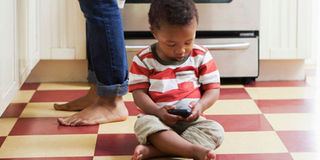Tech toys that give toddlers a bad ‘high’

A baby plays with a phone. PHOTO | FILE
What you need to know:
- As moths are attracted to light, so are toddlers to screens.
- The tech screens allure toddlers with the promise of interactivity and something more engaging than the rest of the environment that they inhabit.
- Parents don’t seem to mind the attention children give these devices.
Times have changed, and changed quite fast. Not so long ago, the most priced property in many homes was the television set, which could be kept in the parents’ bedrooms or locked behind cabinets.
The TV used to be switched on only by parents, mainly the man of the house, to watch prime time news.
Today, phones, tablets and laptops are ubiquitous. Even toddlers and their elder siblings access them with ease. They are the new babysitters.
They are used to coo, soothe and pacify toddlers.
As moths are attracted to light, so are toddlers to screens. They are enticed so strongly that they momentarily “leave” the world and its goodness, including their mothers.
Little wonder that some writers have labelled this new generation of children, The Moth Generation.
ROLES SWITCHED
The tech screens allure toddlers with the promise of interactivity and something more engaging than the rest of the environment that they inhabit. Some even forget to login to the breasts to download their mothers’ milk.
The roles have switched. Previously, young children had to be shown how to use a mouse or a TV remote.
The connection between what they were doing with their hands and what was happening on the TV screen took some time to grasp.
With the proliferation of tonnes of touchscreen tech devices, children come pre-loaded with all the tips and tricks to work the gadgets, and literary roam the digital world without support.
Thanks to their design, versatility and intuitive interfaces, tablets are a perfect way for children to draw, solve puzzles and be entertained on the move.
Combine that with the marketing efforts of digital media companies and app developers — whose measure of success tends to be the amount of time people are glued to their creations.
WATCH TELEVISION
Parents don’t seem to mind the attention children give these devices. As the children are dazed, the parents get time to do other things. But at what cost?
An early strain of research claimed that when we watch television, our brains mostly exhibit slow alpha waves — indicating a low level of arousal, similar to when we are daydreaming.
These findings have been largely discarded by the scientific community, but the myth persists.
Other studies show that hours of background TV also reduces child–parent interaction, which has an adverse impact on language development. This displacement is a big concern.
If children are left with screen-based babysitters, then they are not interacting with caregivers and the physical world. Keep in mind that there are only so many hours in a day, and the time spent with screens comes at the expense of other, potentially better activities.
OBVIOUS RAMIFICATION
Of course there is another obvious ramification. The phone is the filthiest item around you. Studies have shown that a toilet seat is much cleaner than your phone.
Toddlers will either attempt to munch, taste or eat the phone, giving germs an unfettered route to the body. Ever wondered why paediatricians’ offices are always full?
Parents are in a conundrum. On one hand, they want their children to swim expertly in the digital stream that they will have to navigate all their lives. On the other hand, they fear that too much digital media, too early, will sink them.
Babysat by devices, these children could end up being sad, pale creatures who can’t make eye contact and who have avatars for friends.
Yes, an avatar, because of spending tonnes of time online instead of in the real world. Too much and too early online time could yield strange results.
The writer is an informatics specialist. [email protected]. @samwambugu2





